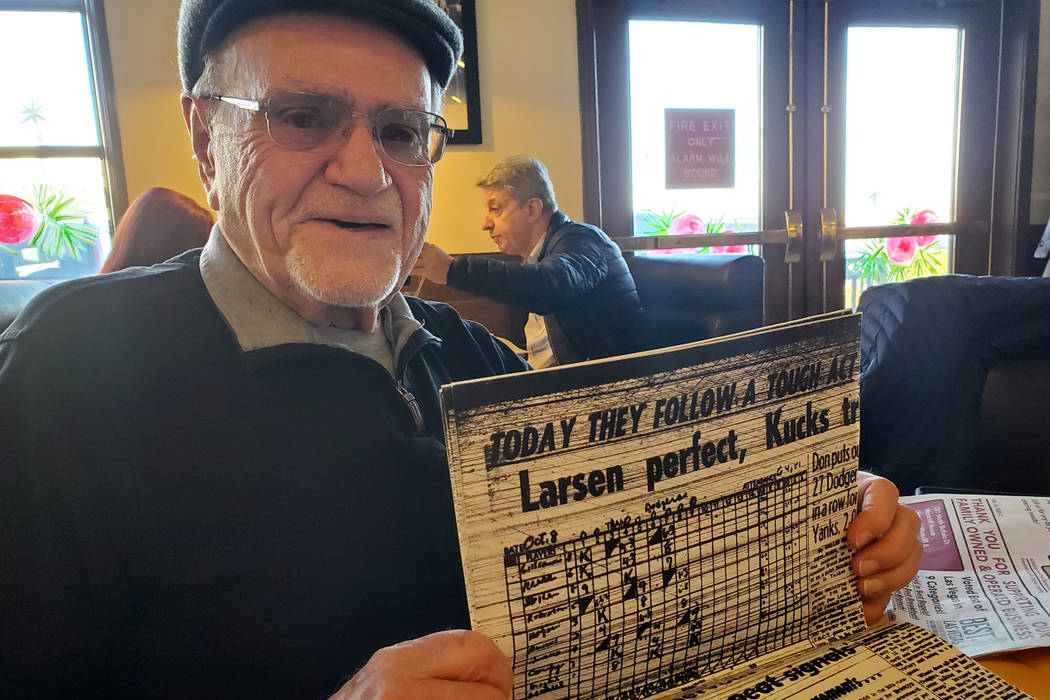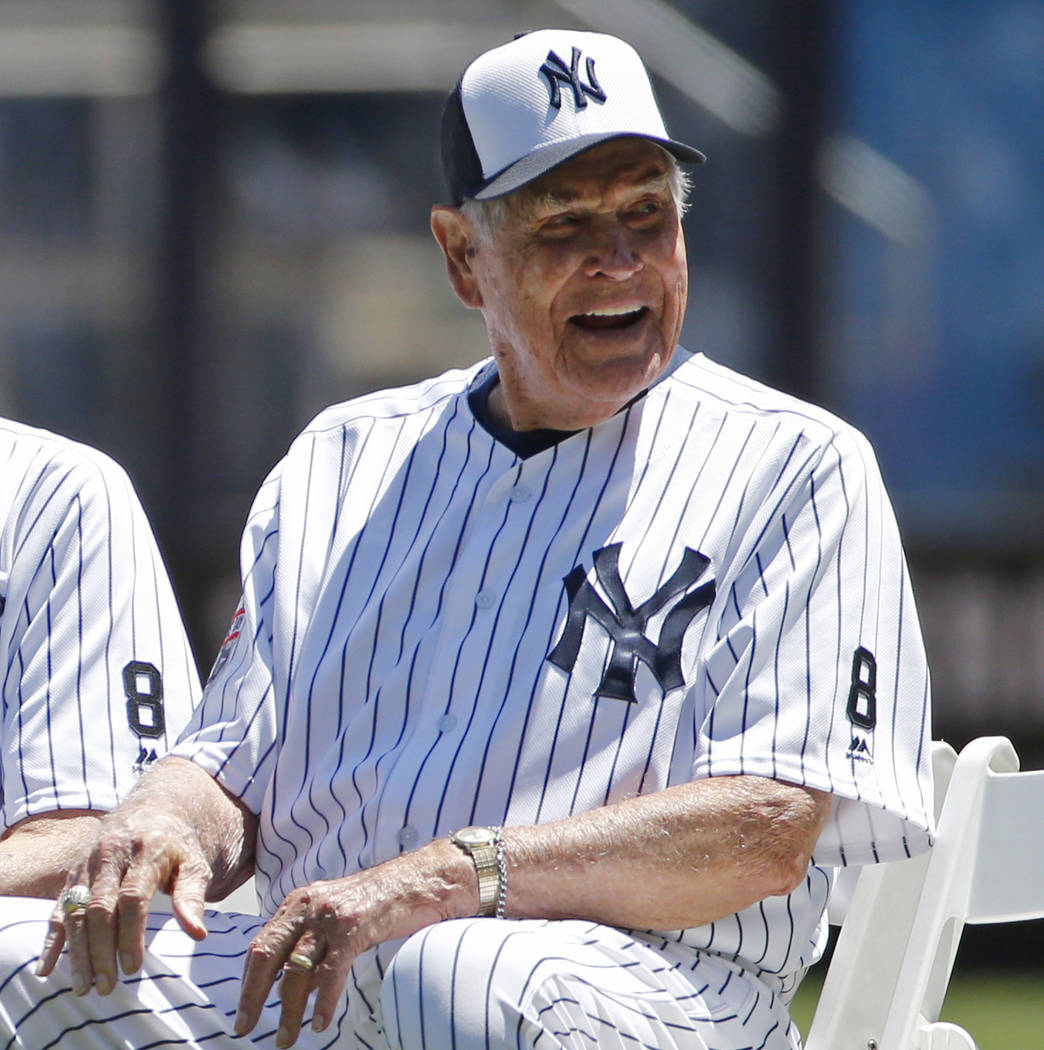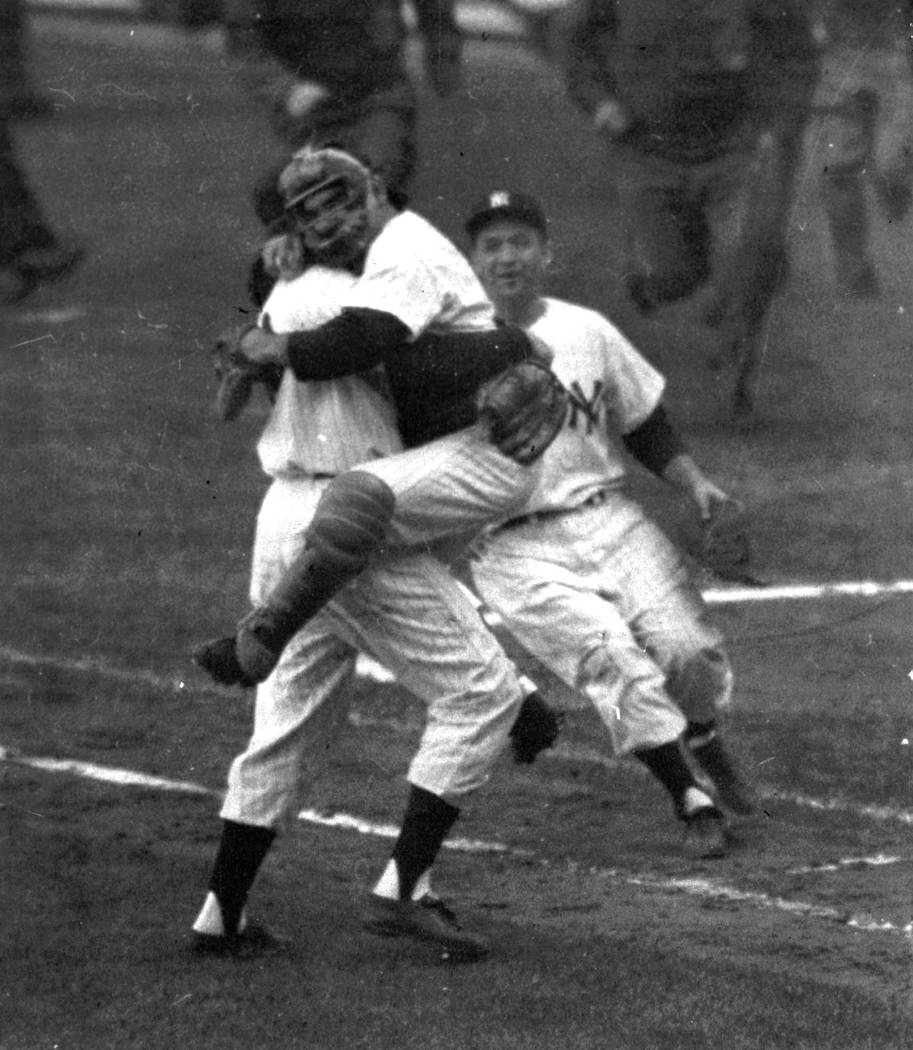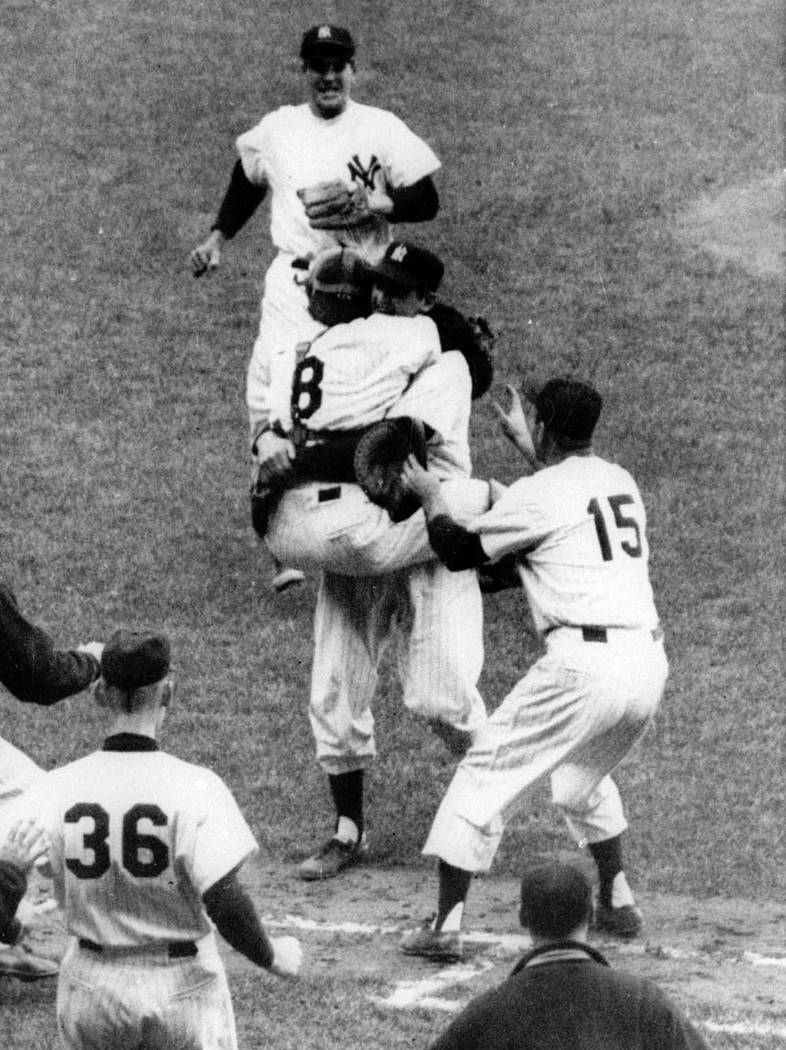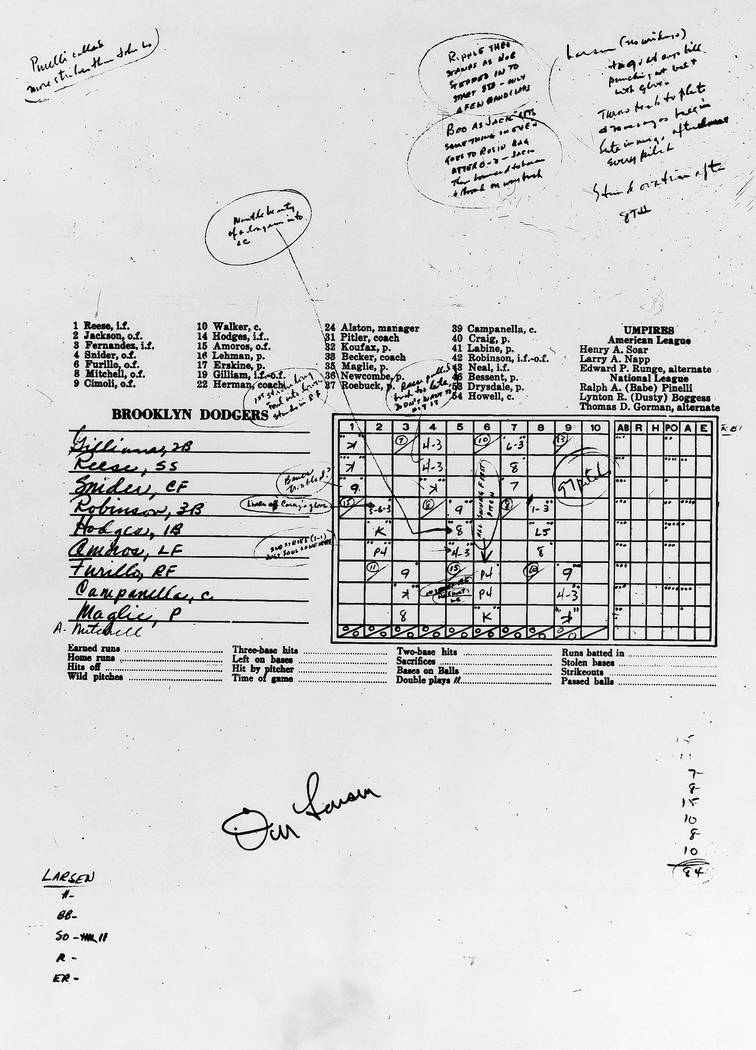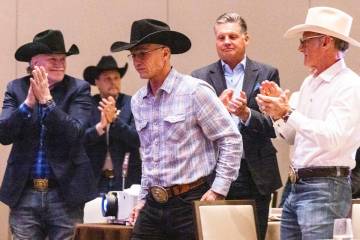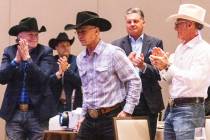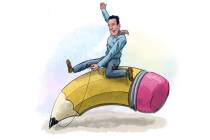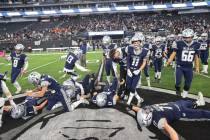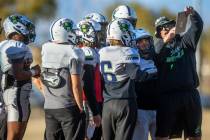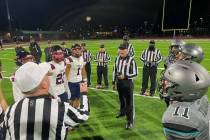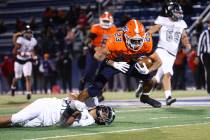Las Vegan recalls Don Larsen’s perfect game as he saw it
Long before he started writing about Summerlin for the Review-Journal, Herb Jaffe was a helluva newspaper man. Before that, he covered baseball.
Herb wrote for the Newark (New Jersey) Star-Ledger for 39 years. He was nominated for the Pulitzer Prize for writing about Tony Soprano-types dumping toxic waste.
He also covered Don Larsen’s perfect game in the World Series.
On Thursday at lunch — on the day after the former Yankees pitcher died in Idaho at age 90 — Jaffe, 87, said he gets asked about bearing witness to Larsen’s perfecto against the Brooklyn Dodgers much more than he does the Tony Soprano-types.
He brought a photocopy of his story that ran Oct. 9, 1956.
“TODAY THEY FOLLOW A TOUGH ACT” read the kicker. “Larsen perfect, Kucks tries for wrap-up.”
There was a picture of the scorecard and then two more headlines: “Larsen so nervous in 9th, Yogi had to repeat signals” and “Only 2 pitches used by Don — slider, fast ball.” Then Herb Jaffe’s story began.
The lead said Don Larsen couldn’t think straight about the magnitude of throwing the first — the only — perfect game in World Series history, and that Yogi Berra called nothing but fastballs and sliders. Then Jaffe described the scene in the Yankees’ clubhouse:
… hordes of flash bulbs popped and a chaotic barrage of screaming newsmen stumbled over one another to get to the dazed, perspiring figure who kept pinching his fingers in the hope of some assurance that it wasn’t all a dream.
Photographers screamed at newsmen blocking their cameras and newsmen screamed back.
Larsen fidgeted with the top button on his uniform. A photographer fell off a table he was standing on and no one seemed to care, and the interviews began.
Some 63 years later and a day after the pitcher who caught baseball lightning in a bottle died, Herb Jaffe was asked if he still could see Larsen standing in the middle of it.
Oh, yes, he said. He recalled that Don Larsen was sporting a crew cut and drinking a beer.
Around the horn
— Bouncing back: After going 6-5 in his return to Montana, former UNLV football coach Bobby Hauck guided the Grizzlies to a 10-4 record and berth in the I-AA playoffs, where they defeated Southeastern Louisiana 73-28 and lost 17-10 to Weber State. Ken Niumatalolo, a former Rebels assistant coach, directed Navy to a 20-17 victory over Kansas State in the Liberty Bowl and an 11-2 record a season after the Midshipmen finished 3-10.
Hope we can get this cleared up by game time. #GoGriz #MontanaTough #RTD pic.twitter.com/rWSkw3rkHu
— Coach Bobby Hauck (@Coach_Hauck) December 2, 2019
— Former UNLV basketball coach Max Good, on Twitter after watching ex-Rebel Patrick McCaw of the Toronto Raptors score 18 points with seven rebounds and eight assists against Boston on Dec. 28: “Will never forget college game when he scored 4 points with 16 rebounds and 11 assists. Asked why he didn’t score more, he said: ‘I didn’t have to.’ Versatile, great IQ and feel. Just needs to be assertive.”
Watched Pat McCaw carve Celtics up in win yesterday . Near triple double . Will never forget college game when he scored 4 pts with 16 rbds and 11 assts . Asked why he didn’t score more , he said “ l didn’t have to .” Versatile , great IQ and feel . Just needs to be assertive .
— Max Good (@CoachMaxGood) December 29, 2019
— “Elvis,” the 25-foot-tall, 2,400-pound helmet prop used to usher the Golden Knights onto the ice at T-Mobile Arena, has been receiving a lot of publicity. But I still say “Mozilla” and “Khem Kong” — The Rebellion cheering section’s massive moving part caricature creations that paid homage to UNLV basketball stars Mike Moser and Khem Birch when Dave Rice was coach — were far greater engineering marvels.
The 25-feet-tall helmet used today was created by Water FX, a Henderson company, and took three months to build https://t.co/5ZMlTnNlAl
— Las Vegas RJ (@reviewjournal) December 27, 2019
RT Mozilla! Go @UNLVRebellion “@si_vault: UNLV fans pay tribute to Mike Moser during Saturday's game against SD State: pic.twitter.com/MKlKEC27”
— BaseballMafiaLV (@Guy_Nason) February 13, 2012
RT @sports8: OK. Now this is cool. "Khem Kong". Well done at UNLV #UNLVMBB pic.twitter.com/zwW8ljE3Sw
— Andy Grossman (@unlvsid) January 23, 2014
0:01
In case the dreamers at UNLV missed this:
A decade ago, Colorado State made a huge commitment to athletics, eventually bumping its athletic budget from $25 million to $40 million. The Rams wanted to compete at a Power Five level instead of in the Mountain West. Facilities were built, recruiting budgets and coaching salaries were increased.
Improvement was minimal.
The Rams still haven’t won a conference football title since 2002.
In December, Colorado State’s faculty counsel asked the school’s new president to reduce athletic department spending.
“We’re still considered a midmajor and not a Power Five university, and my end game was to get us either in the Pac-12 or Big 12,” former Rams athletic director Jack Graham said.
“Given the cost of collegiate athletics today, if you’re not competing at that Power Five level, getting Power Five money from the media rights that come from being in the Power Five, it makes it hard to sustain athletics at a quality level.
“The business model doesn’t work. It just flat-out doesn’t work.”
This is an interesting look at the successes, and failures, of Colorado State's recent increase in athletic spending, but this quote from their former AD stuck out to me:https://t.co/T5Me2KCwtR pic.twitter.com/9qyOS2YO0N
— Matt Brown (@MattBrownEP) December 27, 2019
Contact Ron Kantowski at rkantowski@reviewjournal.com or 702-383-0352. Follow @ronkantowski on Twitter.



